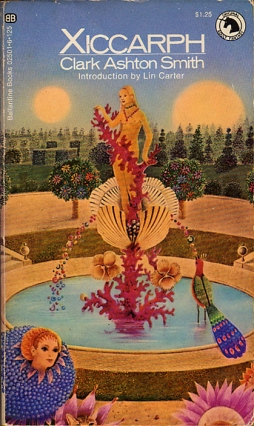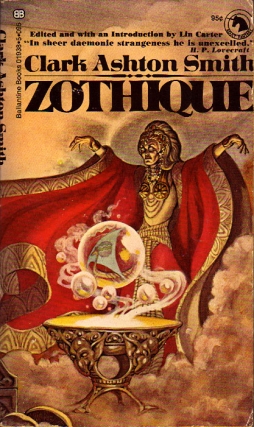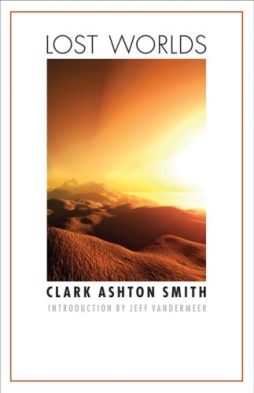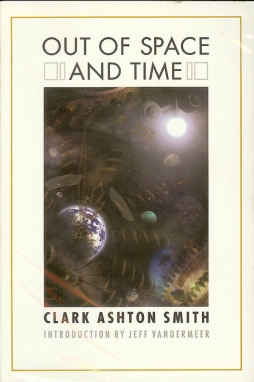A Few Words on Clark Ashton Smith
 Last Friday was Friday the thirteenth. It was also Clark Ashton Smith’s birthday. In memory of that conjunction, I’d like to write a bit about Smith and his work. I have only a few thoughts about Smith’s prose style; Ryan Harvey’s excellent and insightful look at Smith’s fiction can be found in four parts, here, here, here, and here. And you can find an online collection of Smith’s works here.
Last Friday was Friday the thirteenth. It was also Clark Ashton Smith’s birthday. In memory of that conjunction, I’d like to write a bit about Smith and his work. I have only a few thoughts about Smith’s prose style; Ryan Harvey’s excellent and insightful look at Smith’s fiction can be found in four parts, here, here, here, and here. And you can find an online collection of Smith’s works here.
Smith’s probably a familiar figure to many readers of this site, but for those that don’t know him, some background: Born in 1893, Smith suffered from a fear of crowds, and never attended high school. He was an autodidact and dedicated reader; he apparently read, in fact, through the Encyclopedia Britannica and Webster’s Dictionary. He wrote novels as a teenager (I haven’t read them, though in recent years they’ve been put into print), sold a few stories at 17, and then published a collection of verse at 19. Plagued by ill-health, he continued to write poetry, and in 1922 received a fan letter from H.P. Lovecraft. The two men became pen pals, and shared ideas and imagery.
In 1929 Smith began writing weird fiction, odd mélanges of horror, science fiction, and fantasy. He published in Weird Tales, like Lovecraft, and like Robert E. Howard, with whom he struck up a friendship by post in 1933. Howard died in 1936, Lovecraft in 1937, and then late in 1937 first Smith’s mother and then his father passed away. Smith had for the most part stopped writing fiction in 1935; although a few stories came in later years, as well as more verse, Smith shifted his focus to sculpture for much of the rest of his life. He died in 1961.
 Smith’s work seems to be influenced by Edgar Allan Poe, particularly the Poe of prose poems like “Silence: A Fable”. Smith himself wrote several powerful prose poems, some of his most affecting work, thick with imagery. Generally one of the outstanding features of Smith’s prose is its linguistic reach; Smith had an extensive vocabulary, and used it well, creating a voice based on archaism and elaborate diction. I feel that his best work shows what resources that kind of language can give a writer: not only a range of sensory images, but a subtlety of tone, and the power to interrogate recurring themes in diverse ways.
Smith’s work seems to be influenced by Edgar Allan Poe, particularly the Poe of prose poems like “Silence: A Fable”. Smith himself wrote several powerful prose poems, some of his most affecting work, thick with imagery. Generally one of the outstanding features of Smith’s prose is its linguistic reach; Smith had an extensive vocabulary, and used it well, creating a voice based on archaism and elaborate diction. I feel that his best work shows what resources that kind of language can give a writer: not only a range of sensory images, but a subtlety of tone, and the power to interrogate recurring themes in diverse ways.
Read a number of Smith’s tales one after another and you can see some of these themes. He writes about memory and loss, particularly in his prose poems, but in his fiction as well. This is more than mere nostalgia. It’s not so much a yearning for the past as a melancholic recognition of the distance between what is and what was. In some of his stories, wizards or unlucky heroes find a way to overcome the natural process of time and return to the past, as in, say, “The Last Incantation,” “Xeethra,” or “Ubbo-Sathla”; these characters rarely come to good ends (those three examples end with their protagionists respectively heartbroken, damned, and absorbed into a protoplasmic cosmic entity). It is sad that what was has gone by, Smith tells us, but we must accept that it is gone, for time has made us other than what we were when we knew those vanished things.
Along with time, I find Smith obsessed with the theme of age; of autumn and twilight, both of mortal men and women and of the nations they create. The planet Saturn is a recurring image in his earthly tales, with all the resonances of old age the name “Saturn” implies. Smith is fascinated with dust and decay, not so much with death as the last moments leading up to death; or how the dead may be disturbed by the living.
 As a result, much of Smith’s fiction — though not his prose poetry — is morbid, actively horrific. It is both thrilling (due to its wild language describing exuberant terrors) and meditative (because the focus on age and death creates a sense of inevitability to the action of the tales). It’s a tone quite distinct from his friend Lovecraft; less cosmic, more human, and as a result more chilling.
As a result, much of Smith’s fiction — though not his prose poetry — is morbid, actively horrific. It is both thrilling (due to its wild language describing exuberant terrors) and meditative (because the focus on age and death creates a sense of inevitability to the action of the tales). It’s a tone quite distinct from his friend Lovecraft; less cosmic, more human, and as a result more chilling.
Smith’s writing, concerned with age, is also paradoxically involved with flesh and the body. There’s a suspicion of fecundity. Lush plant life and vegetation is often depicted as unnatural. The idea of vitality itself is only another horror, disturbing the tranquility of natural decay. You can see this in, say, “A Voyage to Sfanomoë,” in which two aged academics from Atlantis, with “five-foot ermine beards,” escape by a magical spacecraft to the planet Sfanomoë — Sfanomoë being their name for Venus (again a symbolic planet-name; note also that the second sentence of the story refers to “The chronicles of Saturn”). They find a planet of incredible growth and decay, and in the odd atmosphere of the planet return to infancy and find with “an infantile surprise and bewilderment” flowers growing from their bodies: “And they died with no agony, as if they were already part of the teeming floral life of Sfanomoë, with such perceptions and sensations as were appropriate to their new mode of existence.” You can’t escape the cataclysm that comes with (or that simply is) the passage of time.
Women aren’t common in the stories, most frequently turning up in the tales set in the medieval French land of Averoigne, where Smith set most of his tales dealing with sex and love. Children are extremely rare. Smith’s sensibility did not lend itself to the depiction of new generations, or the renewal of life.
 It is perhaps unsurprising that Smith effectively created the dying-earth subgenre of stories. Smith’s tales of Zothique, the last continent on Earth, take place in an unimaginably far future haunted by demons and ghosts, where necromancers and wizards have unguessable power. Smith’s Zothique stories are some of his best, where his facility with language is both at its freest, creating a whole world out of baroque and gothic imagery, and also at its most resonant, harmonising in its description of torturers and lepers and empires of the dead with the overall themes that seem to spark Smith’s imagination.
It is perhaps unsurprising that Smith effectively created the dying-earth subgenre of stories. Smith’s tales of Zothique, the last continent on Earth, take place in an unimaginably far future haunted by demons and ghosts, where necromancers and wizards have unguessable power. Smith’s Zothique stories are some of his best, where his facility with language is both at its freest, creating a whole world out of baroque and gothic imagery, and also at its most resonant, harmonising in its description of torturers and lepers and empires of the dead with the overall themes that seem to spark Smith’s imagination.
I find the Zothique stories also have some of Smith’s most satisfying plots. On the whole, I think Smith was less interested in plot than language. Many of his tales seem fairly predictable in their development, or end abruptly; it’s as though they needed some third act, a final twist to give them narrative complexity. This is less true of his Zothique stories, and one of them, “Xeethra,” has one of Smith’s best plots — the tale’s a perceptive, brilliant take on the Faust story, well-paced and surprising to the last line despite its antecedents.
Character, though, is almost always fairly minimal. I wonder if this is in part a function of Smith’s sensibility; strong-willed hero-types often come to bad ends, in keeping with Smith’s bent to the horrific. Character in literature is often conceived as being based on wants; but wants are futile in the vastness of time, and meaningless in a fundamentally entropic cosmos. Whether this is so or not, it does seem that in Smith’s work plans go awry in proportion to the determination of the characters that hatch them. And, crucially, it seems rare for character to be pitted against character; more frequently it’s a character against a force of nature, such as time or death, or else against some monster or wizard so powerful as to seem a force of nature.
 The result, as I say, is horrific. Yet it’s also oddly gentle. Futile striving ends in death; but death is also a mercy, a release from striving and pain. A great plague may lay waste a kingdom, yet, deployed properly, once a situation is beyond hope, it can also wipe out an island of torturers.
The result, as I say, is horrific. Yet it’s also oddly gentle. Futile striving ends in death; but death is also a mercy, a release from striving and pain. A great plague may lay waste a kingdom, yet, deployed properly, once a situation is beyond hope, it can also wipe out an island of torturers.
(I should note that Smith’s work is perhaps most reminscent of Lovecraft in the way that stories set in the present day are often told from the point of view of a Lovecraftian antiquary; perhaps more often an artist of unusual vision rather than an Arkham-tenured scholar, but in any event a man notable for his perception and sense of the outré, a man out of step with his times.)
I want to emphasise that I think the relatively simple plots and flat characters work in the context of Smith’s fiction. His prose style is so lush that his stories become about the development of language, of the imagery his protagonists face. Glaciers move, and the gods at the heart of them swell; empires of the dead rise and revolt; wizards toy with emperors; and what matters is not how characters attain their ends, or how the story twists and turns along the way, but how the story unfolds into progressively higher spheres of linguistic accomplishment, how the images build on themselves.
 Smith is a supreme stylist, and the development of his style is typically the point of his stories. His plots exist to give his language a reason to heighten, his images a reason to become more macabre and uncanny. His characters exist so we have a point of view, someone to follow among the unreal grandeur. Oddly, the very lack of specificity of his characters seem to me to help the reader identify with them, when faced with the detailed strangeness they confront.
Smith is a supreme stylist, and the development of his style is typically the point of his stories. His plots exist to give his language a reason to heighten, his images a reason to become more macabre and uncanny. His characters exist so we have a point of view, someone to follow among the unreal grandeur. Oddly, the very lack of specificity of his characters seem to me to help the reader identify with them, when faced with the detailed strangeness they confront.
Ultimately, Smith’s mastery of diction extends to an incredible mastery of tone. He seems to move effortlessly from a kind of irony to absolute certainty in his own weird vision. I think for the reader, it’s tempting to read Smith’s elaborate prose either as utterly serious or as completely tongue-in-cheek; but I also think that Smith is consciously able to include both approaches in his writing, so that the reader somehow moves beyond both the narrative and ironic subversion of the story into an almost meditative (and by extension imaginative) state. Consider the following passages, from “The Dark Eidolon:”
Then, into the hall, there filed an array of tall mummies, clad in royal cerements of purple and scarlet, and wearing gold crowns on their withered craniums. And after them, like servitors, came gigantic skeletons who wore loin-cloths of nacarat orange and about whose upper skulls, from brow to crown, live serpents of banded saffron had wrapped themselves for head-dresses.
A little later:
And the cerements of the mummies stirred and fell open at the bosom, and small rodent monsters, brown as bitumen, eyed as with accursed rubies, reared forth from the eaten hearts of the mummies like rats from their holes and chittered shrilly in human speech … The skeletons in turn took up the solemn sentence; and the black and saffron serpents hissed it from their skulls; and the words were repeated lastly in baleful rumblings by certain furry creatures of dubious form, hitherto unseen by Zotulla, who sat behind the ribs of the skeletons as if in cages of white wicker.
Wild image piles on top of wild image; not just mummies, but skeletons; not just skeletons, but skeletons with serpents for head-dresses. Not just rodent monsters, but rodents with eyes like rubies, and not just rubies but accursed rubies. The richness of invention, the rhythm of fantasy, is incredible.
 And at the same time, you have lines like “certain furry creatures of dubious form.” What I find impressive is that this ironic line doesn’t break the spell of the preceding imagery. Somehow, it seems to heighten it. The vision Smith is describing seems to grow to include irony within itself; there’s no escape from Smith’s imaginative world in sardonicism.
And at the same time, you have lines like “certain furry creatures of dubious form.” What I find impressive is that this ironic line doesn’t break the spell of the preceding imagery. Somehow, it seems to heighten it. The vision Smith is describing seems to grow to include irony within itself; there’s no escape from Smith’s imaginative world in sardonicism.
In saying this I disagree with Jeff VanderMeer, who finds Smith’s use of irony jarring. In his introduction to a 2006 reprint of the Smith anthology Lost Worlds by the University of Nebraska Press, he deprecates lines by Smith he considers “camp,” and praises him for his “sincerity and earnestness.” For VanderMeer, “although there can be an arch tone to [Smith’s] writing — especially in his dialogue — on the whole Smith seems to believe in his worlds so completely that he makes the reader believe in them, too.” I agree with the latter part of that statement, and with VanderMeer’s later assessment that “visionary” is the best descriptor for Smith’s fiction.
But as I read Smith, his archness is conscious, and part of the fabric of his story. VanderMeer singles out a line of dialogue in “The Door to Saturn” for its campness. I think Smith’s tone is too subtle to be adequately labelled camp — but whatever you call it, it’s a recurring element of the story, which even includes something like a punch line in which a line of divine language turns out not to mean what the protagonists think it means. I think also that Smith’s earnestness is something that’s not a naïve feature of his outlook, but something fought for and gained by a deliberate exercise of craft.
VanderMeer, in his introduction to the University of Nebraska Press’ other 2006 Smith anthology reprint, Out of Space and Time, suggests that “Smith’s strengths and weaknesses might be so intertwined that surgery would be required to separate them.” I’d go further. I’d say that what ought to be weaknesses — what are weaknesses in other writers — become strengths in Smith. I think that’s a mark of a real literary artist; that what seem to be standard literary values become subverted or overwhelmed. Smith’s an excellent and subtle writer, a distinct voice with a distinct approach to fantasy. In his work, romance and irony dissolve into each other, mixing in a heady brew of language. He’s not a writer to be simply emulated, but one worth studying — and, above all, worth reading.
Our recent coverage of Clark Ashton Smith includes:
New Treasures: The End of the Story: The Collected Fantasies, Vol. 1 by Clark Ashton Smith
Vintage Treasures: The Timescape Clark Ashton Smith
The Shade of Klarkash-Ton by James Maliszewski
One Shot, One Story: Clark Ashton Smith by Thomas Parker
New Treasures: The Dark Eidolon and Other Fantasies by Clark Ashton Smith
The Crawling Horrors of Mars: Clark Ashton Smith’s “The Vaults of Yoh-Vombis”
Deepest, Darkest Eden edited by Cody Goodfellow by Fletcher Vredenburgh
Adventures in Stealth Publishing: The Return of the Sorcerer
A Few Words on Clark Ashton Smith by Matthew David Surridge
The Unqualified Unique: The Daily Mail Interviews Me for Clark Ashton Smith’s 50th Morbid Anniversary by Ryan Harvey
Of Secret Worlds Incredible: A Psychedelic Journey into Clark Ashton Smith’s Poetic Masterpiece by John R. Fultz
The Fantasy Cycles of Clark Ashton Smith Part I: The Averoigne Chronicles by Ryan Harvey
The Fantasy Cycles of Clark Ashton Smith Part II: The Book of Hyperborea by Ryan Harvey
The Fantasy Cycles of Clark Ashton Smith Part III: Tales of Zothique by Ryan Harvey
The Fantasy Cycles of Clark Ashton Smith Part IV: Poseidonis, Mars, and Xiccarph by Ryan Harvey
Matthew David Surridge is the author of “The Word of Azrael,” from Black Gate 14. His ongoing web serial is The Fell Gard Codices. You can find him on facebook, or follow his Twitter account, Fell_Gard.
Maybe I should give Smith another chance. I made my first foray into his work with The Maker of Gargoyles and Other Stories, and honestly the only story I liked half as much as Darrell Schweitzer’s introductory essay was “The Testament of Athammaus.” I’m not sure what went awry. I might just be the wrong reader, or I might have started with the wrong book, or maybe I was in the wrong headspace for the stories at hand.
What I liked best about Smith was actually much baser than his irony–it was the element of slapstick comedy underlying much of the horror. Some of that slapstick was, I am sure, quite deliberate.
In “Athammaus,” you have the story of a professional headsman confronted with a criminal who keeps growing new heads–it’s sort of like Dr. Seuss’s The 500 Hats of Bartholomew Cubbins, only grosser. I kept picturing the title character played by Buster Keaton. In the opening story in the collection, “The Abominations of Yondo,” you have a story in which a prisoner is told he can have his freedom if he just walks across a dangerous patch of landscape. At the end, as if in a vintage Warner Brothers cartoon, he runs back to his captors. I could almost hear Mel Blanc voice-acting a cry of yipe yipe yipe!
After those two, the rest of the stories seemed painfully overwritten, probably because the comedy that had seemed to me the most engaging thing about the first two stories simply disappeared into Smith’s earnestness. The only moment it resurfaced was in his coda to Vathek, in which one of the tests the narrator must undergo is a long conversation with a demon that doesn’t know it’s ridiculous, and the narrator will be doomed if he laughs.
I entirely agree with you about why Smith’s virtues cannot be assessed by a character-driven rubric. As an incurable extrovert who loves a sprawling ensemble cast, I found the deiiberate deemphasis on character off-putting. I wonder whether I would have to become a different reader to love Smith’s work. Certainly, I found that I wished he were a different writer.
Oh, well. The other day I bought an e-book edition of his poems, a volume from before he took up fiction, in the hope that I’d connect better with that. Haven’t started reading it yet, though. Is there somewhere else I should seek entry to his world?
It’s certainly true that not every writer is for every reader, and vice versa. Ryan made a good argument in his posts that the Hyperborean stories were more darkly humorous than the rest of Smith’s work, so that might be a place to start — the Lin Carter Ballantine Adult Fantasy series had a collection of those tales.
Other than that … I really liked Smith’s prose poetry, which I felt played to his strength — vivid and elaborate description. But I also felt character came across strongly in the prose poems, if only in the form of the ‘speaker’ of the individual poems. I dunno if it’s easily available, but there was a chapbook that came out a few years ago collecting them all. Or the Eldritch Dark site has a separate category for the prose poems.
Good luck, and I hope you find something you like!
Great essay, Matthew.
I tell everyone to start with Tales of Zothique. Smith’s Zothique tales represent the very best of his dark fantasy writings. Not that there isn’t plenty more to discover outside of this cycle, but Zothique and Hyperborea are the two “great cycles” of Smith stories. (“Athammaus” is from The Book of Hyperborea. Also, his Poseidonis tale are great as well. When it comes to Dark Fantasy, it doesn’t get any better than CAS!
Thanks for the suggestions! I’ll give him another shot.
[…] Eater,” and Matthew David Surridge joined this discussion with his 2012 article “A Few Words on Clark Ashton Smith.” Just a few […]
[…] I wrote a brief appreciation of Clark Ashton Smith after reading “The Vaults of Yoh-Vombis” in November — and if you’re at all interested in Smith, I highly recommend Ryan Harvey’s epic four-part The Fantasy Cycles of Clark Ashton Smith series, starting with The Averoigne Chronicles, and Matthew David Surridge’s 2012 article “A Few Words on Clark Ashton Smith.” […]